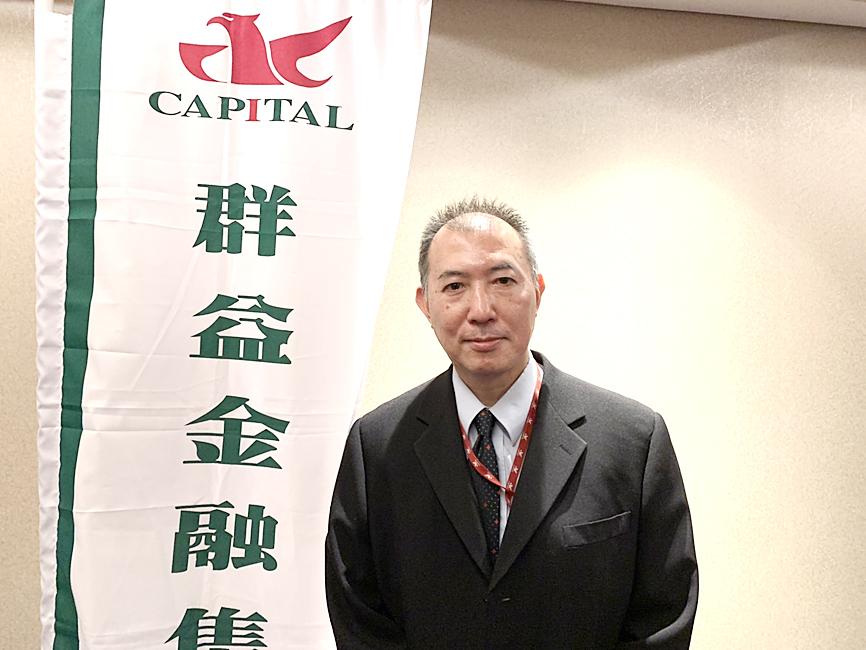The TAIEX is likely to hover between 13,000 and 15,000 points in the first and second quarters of next year as it enters consolidation mode, before rallying in the third quarter and climbing to 16,800 points in the fourth quarter, Capital Investment Management Corp (群益證投顧) said yesterday.
The TAIEX yesterday closed up 1.06 percent at 14,483.07 points, a record high, Taiwan Stock Exchange data showed.
The index is expected to face correction pressure in the first quarter of next year, which is usually a low season for the local technology sector, Capital Investment chairman Andrew Tsai (蔡明彥) said in a media briefing in Taipei.

Photo: Vanessa Cho, Taipei Times
The correction is expected to last into the second quarter, Tsai said, adding that investors tend to sell stocks with low-yield dividends before May, the beginning of the tax season, so they could pay less tax.
“While investors usually hold stocks with yields of at least 4 percent during the tax season, as the high yields would offset higher tax payments, there would be fewer stocks with high yields next year as most companies would remain cautious,” he said.
The TAIEX is projected to move to a range of 14,000 to 15,500 points in the third quarter, as the local technology sector would benefit from more orders in the peak season, Tsai said.
“Experts have predicted that herd immunity [for COVID-19] would be achieved in the third quarter, which would have a mixed effect on the market. Investors would feel relieved and be more optimistic, but governments might consider ending their quantitative easing programs,” he said.
Another risk the local stock market would face is volatility in the US stock market, which would be affected by US president-elect Joe Biden’s policies, Washington’s tax increases on the rich, tighter regulations on Facebook Inc, Apple Inc, Amazon.com Inc, Netflix Inc and Alphabet Inc’s Google, and an overheating of the initial public offering market, Tsai said.
If the US stock market does not crash and governments extend their quantitative easing programs, it is possible that the TAIEX would advance to 16,800 points at most in the fourth quarter, he said.
Capital Investment has an upbeat outlook for local biotech companies, due to rising demand for COVID-19 test reagents and vaccines. It is optimistic about the marine shipping sector on the back of robust demand, as well as sports and leisure equipment companies thanks to higher demand for fitness products, it said.
It also has an upbeat outlook for airlines, as border controls are expected to relax next year, and people might opt to travel on regional routes, such as from Taiwan to Southeast Asia, it said.

NEW IDENTITY: Known for its software, India has expanded into hardware, with its semiconductor industry growing from US$38bn in 2023 to US$45bn to US$50bn India on Saturday inaugurated its first semiconductor assembly and test facility, a milestone in the government’s push to reduce dependence on foreign chipmakers and stake a claim in a sector dominated by China. Indian Prime Minister Narendra Modi opened US firm Micron Technology Inc’s semiconductor assembly, test and packaging unit in his home state of Gujarat, hailing the “dawn of a new era” for India’s technology ambitions. “When young Indians look back in the future, they will see this decade as the turning point in our tech future,” Modi told the event, which was broadcast on his YouTube channel. The plant would convert

‘SEISMIC SHIFT’: The researcher forecast there would be about 1.1 billion mobile shipments this year, down from 1.26 billion the prior year and erasing years of gains The global smartphone market is expected to contract 12.9 percent this year due to the unprecedented memorychip shortage, marking “a crisis like no other,” researcher International Data Corp (IDC) said. The new forecast, a dramatic revision down from earlier estimates, gives the latest accounting of the ongoing memory crunch that is affecting every corner of the electronics industry. The demand for advanced memory to power artificial intelligence (AI) tasks has drained global supply until well into next year and jeopardizes the business model of many smartphone makers. IDC forecast about 1.1 billion mobile shipments this year, down from 1.26 billion the prior

People stand in a Pokemon store in Tokyo on Thursday. One of the world highest-grossing franchises is celebrated its 30th anniversary yesterday.

Zimbabwe’s ban on raw lithium exports is forcing Chinese miners to rethink their strategy, speeding up plans to process the metal locally instead of shipping it to China’s vast rechargeable battery industry. The country is Africa’s largest lithium producer and has one of the world’s largest reserves, according to the US Geological Survey (USGS). Zimbabwe already banned the export of lithium ore in 2022 and last year announced it would halt exports of lithium concentrates from January next year. However, on Wednesday it imposed the ban with immediate effect, leaving unclear what the lithium mining sector would do in the